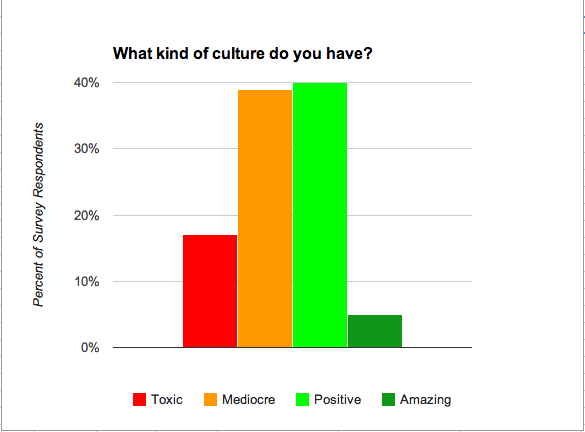A few months ago I gathered a little bit of data from readers (and webinar attendees) about organizational cultures. My hypothesis was that most organizations didn’t do culture very well. Anecdotally, I hear a lot of people complain about their cultures. They put up with them, but they don’t love them. So did the data support my hypothesis? Here are the results.
Below are the four choices I offered in the survey, along with the response rates from the 131 people who responded:
- Toxic–I’m getting out as fast as I can (17%)
- Mediocre–Livable, but not inspiring (39%)
- Positive–Not perfect, but good place to work (40%)
- Amazing–I can’t imagine wanting to leave (5%)
So how do we interpret these results?
Well, it makes sense that most people fell in the middle–those are the easier responses. You have to have a strong opinion about your culture to choose the outlier answers. I did expect more mediocre than positive, but they turned out to be equal, covering almost 80% of the responses.
But notice that Toxic (17%) is three times higher than Amazing (5%). That’s not cool. Interestingly, the number for toxic (17%) is approximately the same percentage that is reported out in employee engagement surveys for the number of people who are so disengaged they are actively sabotaging their own workplace (19% in the last one I saw). It doesn’t make sense to me that we put up with almost a one in five chance of landing at a company with a toxic culture (just like I don’t understand 1 in 5 actively disengaged). Granted, this is a very small data set, so there are no hard and fast conclusions here. But still, the high number of “toxic” responses caught my attention (and made sense, given my hypothesis).
And another way to look at it is this: 95% of us don’t love our culture. That number doesn’t sit right with me either. I’m not sure what the ideal number would be. I don’t expect every culture to be amazing, but 5% still seems disappointing. And as I have learned from working with Fitness Australia, the power of an amazing culture is something to be reckoned with. This is why I feel like in our economy we are leaving significant money on the table by not actively improving our cultures. It takes time and energy. The results you get DO require an investment here. But given how few companies seem to have amazing cultures, it strikes me that you can gain a serious advantage over your competitors if you successfully managed to push your organization in the green bar on the chart.

